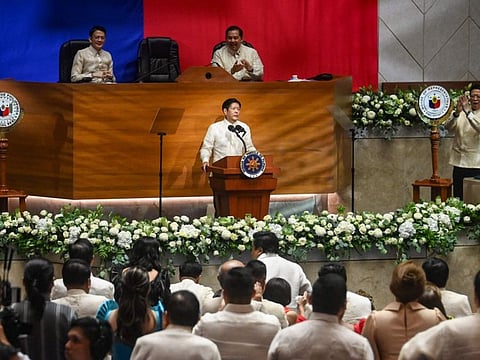Marcos shuts down casinos catering to gamblers overseas
Gambling operators have ventured into illicit areas including financial scams, he says

Manila: The Philippines will ban online casinos catering to gamblers overseas, President Ferdinand Marcos Jr. said on Monday, amid mounting calls to shut the industry.
“Effective today, all POGOs are banned,” Marcos said during his State of the Nation Address, referring to Philippine offshore gaming operators or POGOs.
He instructed the gaming regulator to wind down and cease operations of these gambling facilities by end of the year.
Senators and business groups have asked Marcos to ban POGOs, which target Chinese gamblers and flourished during the term of President Rodrigo Duterte.
The reputational risks as well as crimes associated with the sector outweigh economic benefits, they said.
Marcos announced the ban as lawmakers investigate a mayor accused of money laundering through entities with alleged POGO links. Authorities froze as many as 90 banks accounts linked to Bamban Mayor Alice Guo and other individuals over suspected laundering, human trafficking and fraud — allegations the mayor’s camp has repeatedly denied.
“We hear the loud cry of the people against POGOs,” he said, drawing cheers among lawmakers.
“The grave abuse and disrespect to our system of our laws must stop.”
The president also said that these gambling operators “have ventured into illicit areas” including financial scams, money laundering, human trafficking, kidnapping and even murder. He also directed economic managers to find new jobs to employees who will be displaced.
Curbing inflation
Marcos Jr. also pledged measures that will lift the farm sector and help curb inflation that’s preventing the majority of Filipinos from feeling the benefits of faster economic growth.
“The hard lesson of this last year has made it very clear that whatever current data proudly bannering our country as among the best-performing in Asia means nothing to a Filipino, who is confronted by the price of rice at 45 to 65 pesos per kilo,” Marcos said.
His remarks come as the Philippines continue to grapple with rice inflation above 20% along with poverty and joblessness. While the economy has demonstrated resilience and inflation has cooled to within the central bank’s 2%-4% target this year, elevated cost of living has dominated Filipinos’ worries.
Marcos, in his speech, identified projects that include boosting farm-to-market roads, irrigation, providing vaccines against swine fever and tightening rules to prevent smuggling. The president urged lawmakers to review the power sector law to bring down energy costs.
Tamping down rice prices has in particular posed a challenge to Marcos who promised to bring down the staple grain’s cost when he ran for the top job. His government recently slashed rice tariffs to further tame food inflation.
Marcos has largely managed to keep the Philippines’ economic growth momentum to become one of the region’s bright spots. His economic managers are aiming to grow the economy by 6% to 7% this year by spending on infrastructure and wooing investments.
Strains on the economy are however showing, with growth drivers including consumption ebbing in the first quarter amid high borrowing costs.
Sign up for the Daily Briefing
Get the latest news and updates straight to your inbox



